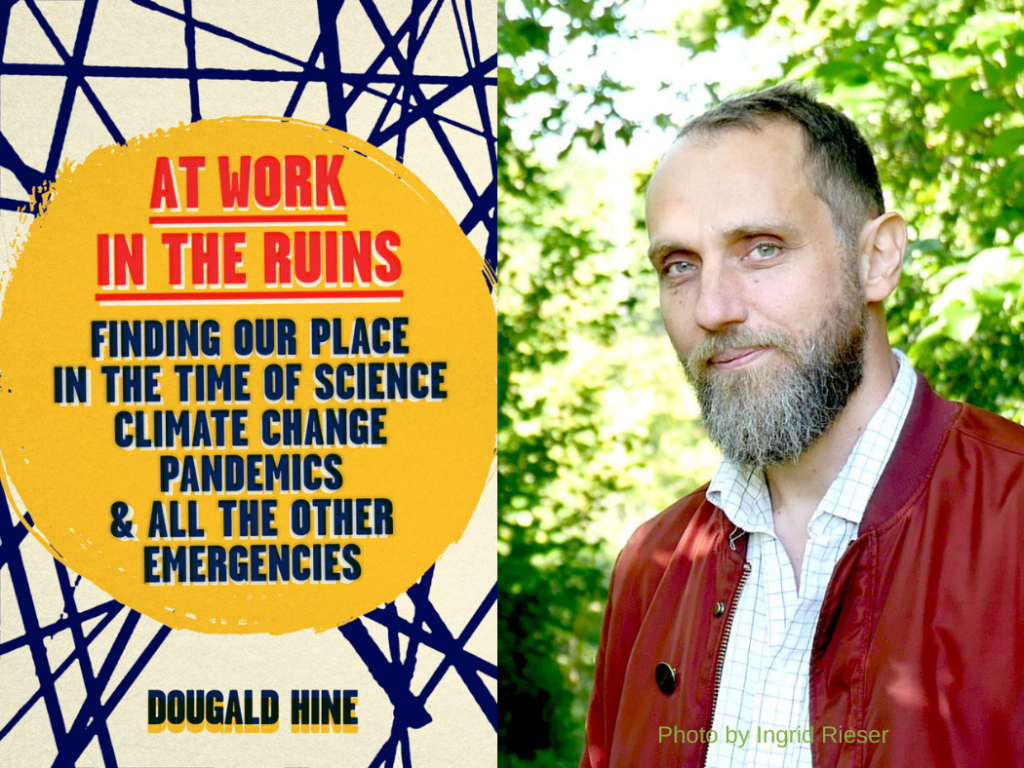Why down to earth beats fishtank modernity
This is a very helpful, illuminating book, though not in the ways I hoped. The idea of ‘solutions’ to the climate crisis is long gone for me, but I am thirsty for guidance on practical adaptation in local communities. Dougald’s book only hints at this, but it has excellent insights on how habitual assumptions and ways of seeing limit us.
At Work in the Ruins is very perceptive about the overly dominant voice of science in the climate crisis, and how the pandemic has reinforced this. The whole book is peppered with wise quotes, like this one from Paul Kingsnorth: “Science is an ideology posing as a method.” He usefully chronicles the climate movements which emerged in 2018 (Greta, XR, Deep Adaptation), and sees them compounding the dominant voice of science by pinning their campaigns around it.

Hine has worked a lot with climate scientists, and believes they’ve been given a level of authority which they mostly didn’t want, and which badly limits our capacity to see our situation clearly and creatively. This is aggravated because science is so entwined with what he calls ‘fishtank modernity’: a tank for domestic pet fish needs lots of chemicals and labour to do what Nature does effortlessly in a river. His delightful contrast between Israeli chickens and Palestinian (resilient survivor) chickens makes the same point.
This book explains with awful clarity how the mainstream (politicians, business, etc.) will always revert to modernity as the best response to climate change and all the other crises of our times – because modernity maintains the status quo of capitalism and the extremes of privilege and exploitation that go with it.
A feature of this book which I hadn’t expected is its lucid review of the covid pandemic, and why most governments imposed such drastic controls. Hine observes that this was quite unlike their hands-off response to the flu pandemics some decades earlier. He thinks the pivotal event was early on, when hospitals in northern Italy were overwhelmed by covid cases, which highlighted, as he puts it, “a scarcity of the means of dying”.
What this arises from is the rapid erosion of family and community cohesion in recent decades, so the capacity to support people dying at home has been lost, and governments acted drastically to avoid public health services drowning. He dismisses beliefs that covid was a contrived conspiracy.
So is there an alternative to modernity? This book sketches it out, and usefully shows how some of our beliefs and ways of thinking need to change before we can see alternatives. He writes, “The small path… is made by those who seek to build resilience closer to the ground… oriented to a future in which existing trajectories of technical progress, economic growth… will not be sustained.”
Hine draws insights from Ivan Illich, who observed that the advantages of modern societies tend to be cancelled out as we become more dependent on them. So local resilience, with more simple and robust systems for food and energy supply, is a clear priority.
Many of us, including me, would like a simple road map and set of directions to steer us out of this chaos, and I respect Hine for not providing one. Instead, we have to think and feel differently, giving up on ‘solutions’, trusting in uncertainty: “the journey down to earth starts with an awakening to our own complicity, but also to our helplessness and absurdity”.
Hine is not anti-science, and has good ideas on a better role for it. He suggests we should “salvage the good that may be taken with us from the ruins of the world that is ending”, and also “look for the skills or practices or knowledges that have been marked as extinct, for some of these may yet make all the difference”.
It’s just this kind of exploration, for local communities and at household level, which I’m keen to be part of, and to encourage more sharing of insights and support. I’m not yet clear on the best ways to do this: if you’d like to be part of the exploration, please contact me. You’ll find some relevant resources and blogs in the Adaptive Communities section www.seedingourfuture.org.uk.
